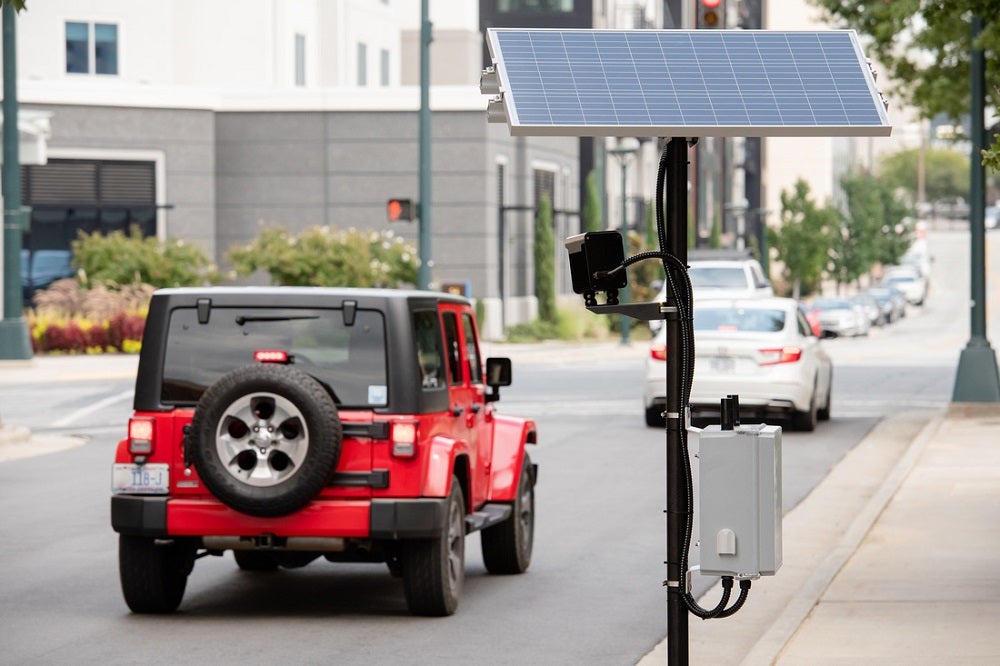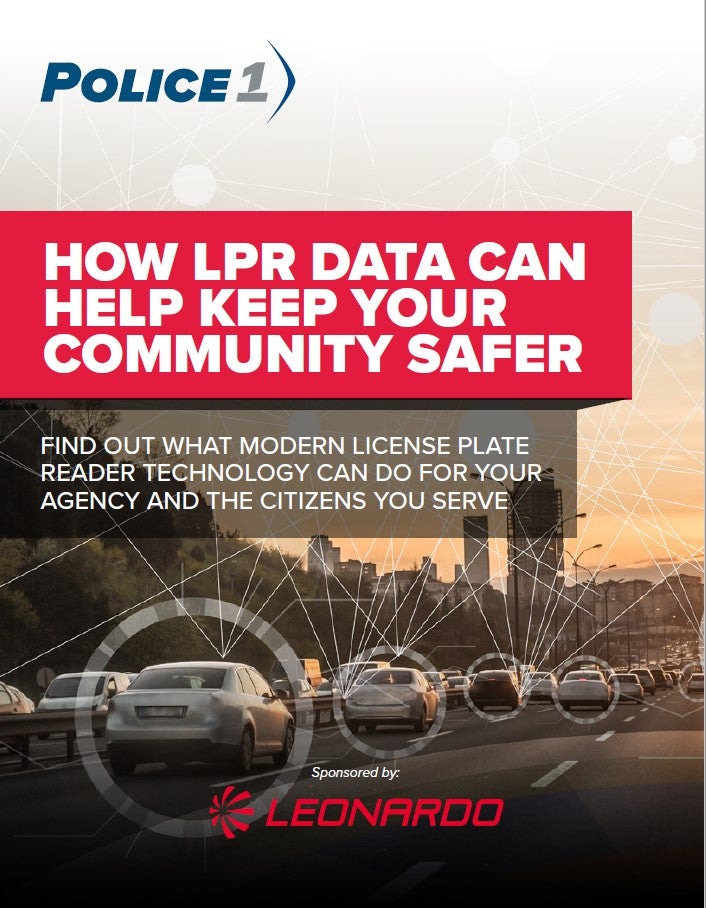
“The first conversation is, what is your goal with ALPR as an agency? We want to define and support that goal,” says Rob Ryan, a retired police officer with a wealth of experience, who now works with leading license plate recognition company Leonardo, which has successfully used its technology to aid law enforcement for over 20 years.
Ryan’s 33 years in law enforcement gives him a unique perspective. Starting out as a patrol officer, he worked his way up through narcotics to a taskforce position for the Drug Enforcement Administration (DEA) in Oklahoma City, before becoming a federal agent and Task Force Supervisor. It was while working for the DEA, that he first encountered Leonardo.

Access deeper industry intelligence
Experience unmatched clarity with a single platform that combines unique data, AI, and human expertise.
“They were one of the companies that we used in DEA’s National LPR program,” notes Ryan. “When I decided to retire from DEA HQ in 2019, several companies gave me an opportunity to come on board. I chose Leonardo because I thought it was the best fit for me ethically and mission wise in supporting the law enforcement mission across the US.”
Ryan is still passionate about law enforcement and now works with police forces and enforcement agencies who may be hesitant about using technology such as ALPR. Ryan outlines here four of the biggest obstacles he sees from law enforcement agencies, as well as providing some solutions.
1 – Limited budgets

“License plate readers, in general, have always been ‘nice to have’ but not a necessity,” explains Ryan. “But now, with the successes that we see nationally, you’re starting to see many agencies understand the need for ALPR. It’s a necessity to solve the crimes of today which move very quickly across jurisdictional boundaries. It’s something that helps agencies cooperate and work together to solve crime.”
One issue Ryan sees time and again is how agencies need to manage their budgets.
“Enforcement agencies in the US prefer to have their capital expenditures all up front. In my experience, most agencies don’t like having recurring fees, something they have to budget for every year. What I encourage clients to think about is the return on the investment. By having that purchase up front, it’s done.
“But at Leonardo, we do see the value of having options for those agencies that need them. So, we have options of equipment purchase; of equipment leasing; lease to purchase; and for subscription. We strive to make it easy for all agencies to participate and to gain the technology in whatever way they see fit and whatever works best for them. It’s all based on the customer.”
2 – Difficulty navigating or researching available grants
Ryan points out another issue, particularly for smaller forces: “A lot of times I go out and meet smaller agencies and they simply say no, we can’t afford ALPR. And my answer to that is, what if you could?”
There are grants available for some agencies. However, researching what’s out there and submitting applications can be time consuming and complex. Leonardo has partnered with PoliceGrantsHelp to provide free, grant research assistance.
“We encourage them to sign up on our website for this grant assistance. It’s a completely free process for the agencies, a service that we do as a company. There’s no requirement that they come back to us even if they do get their money, we just want to help them get the funding they need for this technology, and we believe our service is the best choice.”
Success rates are high. Leonardo says that over half of agencies that signed up or applied for grants under this programme received money.
3 – Lack of server space or IT support to handle data
Keeping up with modern technology trends can be difficult for non-experts. Is perceived lack of technical knowledge an issue that police and law enforcement agencies claim is holding them back? “Absolutely, and it is a problem especially for smaller agencies. They don’t have the IT budgets and they don’t have the same level of IT personnel to manage those things,” comments Ryan.
“Another large-scale database system to manage is sometimes overwhelming. So that’s why we provide several options to assist them. With our hosted cloud service, agencies don’t have to manage their own server. That’s something that they can buy into and have that cloud service that’s compliant with all national standards.”
Additionally, Leonardo has a strong partnership with the National High Intensity Drug Trafficking Area (HIDTA) program – a drug-prohibition enforcement program run by the United States Office of National Drug Control Policy in Washington DC. With its own budget, the HIDTA program funds task forces across the country for drug and violent crime enforcement, including a National LPR System serviced by Leonardo. Agencies can join the system by signing an MOU with HIDTA, meaning no additional maintenance or access fees.
4 – Privacy and data security concerns
Another point Ryan often hears from customers is concerns over data security. He points out that all the data servers are US-based. Except for the hosted service, these are run by law enforcement, not commercial enterprises. For agencies running ALPR systems, policy is the key, says Ryan.
“We have a number of different controls, and it starts first with policy. When I talk to clients who are just starting an ALPR program, they are encouraged to have policies before technology. The good thing about our HIDTA program is that policy is already in place and tested.
“It includes having a firm auditing program. We have training that we provide to all our users, not just on how to use the system, but what the best practise in those systems would be. One of the big concerns of privacy organisations is who has access to the data? That must be rigorously checked and controlled, which we do within our software and cooperation with our customers.”
“Every agency has to have what we call an ALPR administrator who is responsible for managing the policy, the auditing, and the training. We teach them how to do that and provide training (mandatory for HIDTA) before anyone can get their user access.”
Ryan also notes that different US states have different laws on data retention. “Our system allows us to have multiple, different layers of data retention, especially in the HIDTA system (the HIDTA system has a standard data retention). An agency from a different state in the US with a lower data retention requirement, that’s just a push of a button to control in our system. We comply and make sure that we maintain all those things on a local level, within the larger system.”
Despite these measures, opposition to ALPR within the agency’s local community is expected. Ryan says that he understands the community’s reluctance to surveillance but everything that they do is legal, focused on public roadways. “We don’t put cameras on private citizens. We focus on law enforcement policy and law in everything that we do. By the definition of being on a police vehicle, a camera has a legal right to see what it sees.”
Saving lives
Finally, Ryan notes that it is not just about reducing crime; ALPR can save lives. A recent case involving a kidnapped child was successfully resolved when cameras recorded the suspect vehicle and provided a direction of travel for investigators.
“ALPR provides information to law enforcement that helps solve cases and save lives,” says Ryan. “Access to a network that serves a local agency but is tied to a National Database is essential to this success. Our cameras have helped law enforcement solve local crimes such as robbery, burglary, hit and run accidents, and homicides. The national HIDTA network provides a larger platform to help catch dangerous fugitives, interdict huge loads of illicit drugs and contraband, millions of dollars of drug related money and most importantly, recover innocent children who have been abducted, through Amber alert notices.”
Leonardo features several types of cameras for different purposes and budgets, explains Ryan: “High speed cameras for highways. Lower speed cameras for force protection at secure complexes. Semi-Fixed Speed Trailer platforms and our solar powered Street Sentry, our newest camera built for city saturation. The Street Sentry is very low cost and allows a lot of these smaller agencies to come on board where they couldn’t before.”
“We strive to provide a range of services. A range of financial capabilities, and a range of products, to solve every agency’s goal with their ALPR program.”


